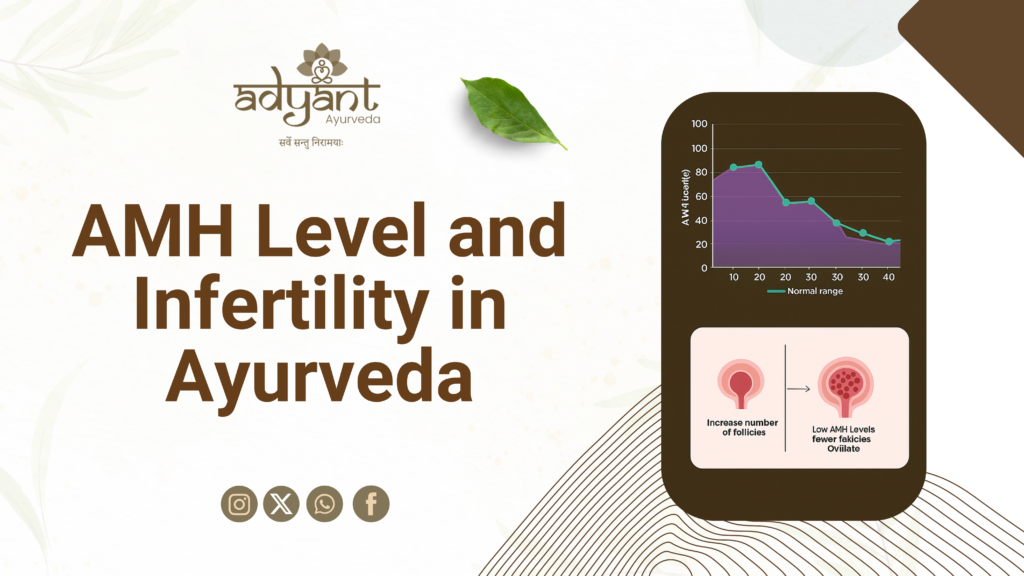Table of Contents
ToggleAyurvedic Treatment to Improve AMH and Boost Fertility: Infertility has become a rising concern among women, especially those in their late 20s to early 40s. Among various fertility markers, AMH (Anti-Müllerian Hormone) is considered a crucial indicator of ovarian reserve. While modern medicine often focuses on aggressive treatments like IVF or hormone therapy, Ayurveda offers a natural, root-cause-based approach to restoring hormonal balance and reproductive health.
“Fertility is more than numbers. It’s about balance, nourishment, and timing — all of which Ayurveda addresses beautifully.”
Expert Care at Adyant Ayurveda
At Adyant Ayurveda, our team includes expert Ayurvedic physicians with 24+ years of clinical experience in fertility care, integrating classical Ayurvedic wisdom with modern diagnostic tools. Each treatment plan is personalized after thorough consultation, ensuring both safety and effectiveness.
While modern medicine relies heavily on assisted reproductive techniques, Adyant Ayurveda focuses on improving the body’s inherent ability to conceive through natural detoxification and rejuvenation.
What is AMH (Anti-Müllerian Hormone)?
AMH is a hormone secreted by the follicles in a woman’s ovaries. It helps assess a woman’s ovarian reserve—the number and quality of eggs she has left. Unlike FSH (Follicle Stimulating Hormone), AMH levels remain relatively stable throughout the menstrual cycle and provide a more accurate view of fertility potential.
Important: AMH is a helpful indicator, not a fertility verdict. A low AMH value signals a reduced egg reserve but does not mean pregnancy is impossible, especially if egg quality and hormonal environment are supported.
AMH Testing:
“Although AMH can be tested anytime, cycle monitoring through BBT charting and ovulation tracking is also encouraged in Ayurvedic assessment.”
A simple blood test, done anytime during the menstrual cycle
Not affected by hormonal contraceptives
AMH vs. Other Fertility Tests:
AMH – Ovarian reserve
FSH/LH – Cycle regulation
AFC – Antral Follicle Count
TSH – Thyroid function
Standard AMH Level Interpretation:
| AMH Level (ng/mL) | Interpretation |
|---|---|
| Above 3.0 | High (PCOS or high reserve) |
| 1.0 to 3.0 | Normal ovarian reserve |
| 0.5 to 1.0 | Low ovarian reserve |
| Below 0.5 | Very low reserve |
AMH measures quantity, not quality. Even women with low AMH can conceive with proper support.
Infertility and AMH: The Modern Medical View
“Women with low AMH can still conceive naturally if egg quality and hormonal environment are supported. Ayurveda’s approach focuses on improving both these aspects simultaneously.”
Hormone therapy or replacement
IVF/IUI cycles
Egg freezing or donor eggs
PCOS is linked to high AMH and immature follicles
Ayurvedic Understanding of AMH and Infertility
Ancient Ayurvedic texts like Charaka Samhita and Ashtanga Hridaya describe Vandhyatva (infertility) as a multi-factorial condition involving:
Vitiated Vata dosha
Depleted Artava Dhatu (female reproductive tissue)
Weak Agni (digestion/metabolism)
Blocked Srotas (reproductive channels)
Four Pillars of Fertility in Ayurveda:
Beeja – Healthy ovum and sperm
Kshetra – Nourished uterine environment
Ambu – Nutritive hormones/fluids
Ritu – Right timing of ovulation
Low AMH is conceptually linked to Beeja Kshaya (ovum degeneration), which can be reversed through Rasayana and Panchakarma therapies.
Ayurvedic Diagnostic Approach at Adyant Ayurveda:
Nadi Pariksha (pulse diagnosis)
Menstrual cycle & ovulation review
Agni & Ama analysis (digestive fire & toxin build-up)
Emotional health & stress assessment
How Ayurveda Improves AMH and Fertility
“Ayurveda supports the Hypothalamic-Pituitary-Ovarian (HPO) axis, which governs the hormonal dialogue between the brain and the ovaries. By restoring balance in this axis through therapies and Rasayana herbs, ovulation and AMH levels can naturally improve.”
Ayurveda works at multiple levels:
Balances Apana Vata (downward energy that governs reproductive function)
Nourishes Shukra & Artava Dhatus
Enhances mental wellness using holistic therapies and herbs
Mind-Body Axis:
Therapies like Shirodhara, meditation, and herbs like Brahmi and Tagara help reset the HPO (Hypothalamic-Pituitary-Ovarian) axis, reduce cortisol, and support ovulation.
Agnimandya & Dhatu Formation:
Weak digestion (Agnimandya) leads to poor Rasa Dhatu formation. Without a healthy Rasa, deeper tissues like Artava (reproductive tissue) become depleted. Hence, Ayurveda first focuses on Ama clearance and Agni strengthening.
Panchakarma Detox Therapies
Virechana: Detoxifies the liver, hormonal pathways
Basti (especially Uttara Basti): Nourishes the uterus and ovaries
Nasya: Clears mental toxins and balances hormonal channels via the nasal route
Ayurvedic Herbs and Rasayanas
Caution: All herbs should be taken only under expert supervision, as inappropriate use can aggravate dosha imbalance.
Shatavari: Enhances ovulation, supports estrogen balance
Ashwagandha: Reduces cortisol, boosts vitality
Guduchi, Amalaki, Yashtimadhu: Rejuvenate and detoxify
Jeevanti, Brahmi, Tagara: Calm the mind and enhance reproductive vitality
Diet and Lifestyle Recommendations
Warm, nourishing foods: ghee, milk, dates, soaked almonds
Avoid Viruddha Ahara: incompatible, stale, fried, or overly processed foods
Follow Dinacharya (daily routine) and Ritucharya (seasonal regimen)
Practice digital detox, quality sleep, and stress reduction techniques
Rasayana & Garbhasanskar at Adyant Ayurveda
Garbhasanskar: Prepares the mind and body for healthy conception
Rasayana Therapy: Deep rejuvenation at the tissue level
Yoga & Pranayama: Reduce Vata, balance hormones, improve mental health
Duration of Treatment
“Patients are encouraged to maintain a menstrual calendar, noting changes in flow, cycle length, ovulation, and PMS symptoms—these are vital indicators in Ayurvedic fertility tracking.”
Visible improvements usually within 3–6 months
Progress is tracked through menstrual health and lab diagnostics
Male Fertility Support in Ayurveda
About 30–40% of infertility cases are linked to male factors.
Ayurveda enhances:
Sperm count and motility
Shukra Dhatu quality
Libido and stamina
Key herbs: Kapikacchu, Gokshura, Ashwagandha
Real-Life Success Stories
Many women with AMH as low as 0.3 ng/mL have successfully conceived after undergoing customized Ayurvedic protocols at Adyant Ayurveda.
Success includes:
Dietary and lifestyle changes
Herbal fertility boosters
Can Ayurveda improve egg quality?
Yes, Ayurveda can help improve egg quality by addressing the root causes that affect reproductive health. According to Ayurveda, poor egg quality is often linked to hormonal imbalance, weak digestive fire (Agni), toxin accumulation (Ama), and disturbed Vata and Pitta doshas. Through personalized treatment—including herbal medicines, diet correction, lifestyle guidance, and doctor-supervised therapies—Ayurveda works to nourish the reproductive tissues (Artava Dhatu), support healthy ovarian function, and promote natural hormonal balance, thereby holistically improving overall egg quality.
Why Consider Ayurveda for Fertility?
“Even women with conditions like premature ovarian insufficiency or repeated IVF failures have shown improvement in menstrual regularity, hormonal balance, and mental well-being through Ayurvedic care.
“Several of our patients with AMH as low as 0.2–0.4 ng/mL successfully conceived within 6–9 months of starting Ayurvedic protocols customized at Adyant Ayurved
Low AMH (<1 ng/mL)
High AMH with PCOS
Failed IVF/IUI cycles
Women over 35 planning conception
Irregular menstrual cycles
Even in cases of ovarian failure or absent uterus, Ayurveda helps rebalance hormones and restore emotional well-being.
Conclusion: Hope Beyond Numbers
Low or high AMH is not the end of your fertility journey. Ayurveda looks beyond the lab report and focuses on root cause healing, emotional harmony, and deep rejuvenation of reproductive tissues.
“Fertility is more than numbers. It’s about balance, nourishment, and timing — all of which Ayurveda addresses beautifully.”
At Adyant Ayurveda, we provide personalized, classical Ayurvedic care combined with modern diagnostics and compassionate follow-ups.
Start Your Fertility Journey
Call/WhatsApp: 9972541009
Visit: www.adyantayurveda.com
Frequently Asked Questions (FAQs)
What is a good AMH level for pregnancy?
1.0–3.0 ng/mL is considered optimal.
Can Ayurveda increase AMH?
1.0–3.0 ng/mL is considered optimal.
Can I conceive with AMH below 1?
Yes. Many women have succeeded with Ayurvedic support.
What herbs are used for fertility in Ayurveda?
Shatavari, Ashwagandha, Guduchi, Amalaki, Brahmi, Jeevanti.
How long does treatment take?
Usually 3–6 months, depending on individual factors.
Is Panchakarma mandatory?
Highly recommended for deep detox and hormonal reset.
Can Ayurveda help after failed IVF?
Yes. It enhances receptivity and prepares the body naturally.
Are Ayurvedic treatments safe after 35?
Yes. Customized protocols are safe and supportive.
Does male fertility improve with Ayurveda?
Absolutely. Several therapies have been proven for sperm quality.
How do I begin treatment at Adyant Ayurveda?
Call or WhatsApp us at 9972541009 or visit our website.
Disclaimer: This article is for educational purposes only. Please consult a qualified Ayurvedic physician before starting any treatment.
This blog on Ayurveda for AMH has been written by Dr. Shree Lakshmi, Senior Ayurvedic Consultant at Adyant Ayurveda, Jayanagar, Bangalore. With deep expertise in women’s health and infertility care, Dr. Shree Lakshmi offers holistic, personalized treatment plans rooted in classical Ayurvedic principles.









